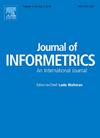Investigating the effect of publication text similarity between reviewers and authors on the rigor of peer review: An intellectual proximity perspective
IF 3.5
2区 管理学
Q2 COMPUTER SCIENCE, INTERDISCIPLINARY APPLICATIONS
引用次数: 0
Abstract
The involvement of experienced peers as reviewers plays a crucial role in manuscript evaluation during the peer review process. Nonetheless, concerns have arisen regarding potential cognitive bias when reviewers assess research that is outside their areas of expertise. Despite these concerns, quantitative analysis of this issue remains limited. This study aims to empirically investigate whether submissions reviewed by peers with academic backgrounds similar to the authors’ research areas correlate with more rigorous comments during the peer review process. Utilizing a dataset of 2,147 papers published in the journal eLife, along with their publicly available peer review reports and reviewers’ publication records, we employed natural language processing techniques to measure the publication text similarity of reviewers to that of the manuscript’s authors, representing a minuscule part of intellectual proximity. We then used a linear regression model to examine whether such similarity was associated with review rigor, quantified by the frequency of statistical terms from two well-known glossaries. We observed no statistically significant differences in the rigor of comments made by peers with varying levels of publication text similarity in the constructed dataset and setting. The findings remained consistent across several robustness checks and alternative specifications. This suggests that no discernible cognitive bias is introduced by the reviewers’ academic background during the peer review process, enriching the extant literature and offering important insights into understanding the role of reviewers in maintaining fairness.
研究审稿人和作者之间的出版物文本相似性对同行评审严谨性的影响:一个智力接近的视角
在同行评审过程中,有经验的同行作为审稿人的参与在稿件评估中起着至关重要的作用。尽管如此,当审稿人评估其专业领域以外的研究时,对潜在认知偏差的担忧已经出现。尽管存在这些担忧,但对这一问题的定量分析仍然有限。本研究旨在实证调查学术背景与作者研究领域相似的同行审稿是否与同行审稿过程中更严格的评议有关。利用发表在《eLife》杂志上的2147篇论文的数据集,以及他们公开的同行评审报告和审稿人的发表记录,我们采用自然语言处理技术来衡量审稿人与手稿作者的发表文本相似度,这代表了智力接近度的一小部分。然后,我们使用线性回归模型来检验这种相似性是否与审查的严谨性有关,并通过两个知名词汇表中统计术语的频率来量化。我们观察到,在构建的数据集和设置中,不同水平的出版物文本相似度的同行所发表的评论的严谨性在统计上没有显著差异。结果在几个稳健性检查和替代规范中保持一致。这表明审稿人的学术背景在同行评议过程中没有引入明显的认知偏见,丰富了现有文献,并为理解审稿人在维护公平方面的作用提供了重要见解。
本文章由计算机程序翻译,如有差异,请以英文原文为准。
求助全文
约1分钟内获得全文
求助全文
来源期刊

Journal of Informetrics
Social Sciences-Library and Information Sciences
CiteScore
6.40
自引率
16.20%
发文量
95
期刊介绍:
Journal of Informetrics (JOI) publishes rigorous high-quality research on quantitative aspects of information science. The main focus of the journal is on topics in bibliometrics, scientometrics, webometrics, patentometrics, altmetrics and research evaluation. Contributions studying informetric problems using methods from other quantitative fields, such as mathematics, statistics, computer science, economics and econometrics, and network science, are especially encouraged. JOI publishes both theoretical and empirical work. In general, case studies, for instance a bibliometric analysis focusing on a specific research field or a specific country, are not considered suitable for publication in JOI, unless they contain innovative methodological elements.
 求助内容:
求助内容: 应助结果提醒方式:
应助结果提醒方式:


